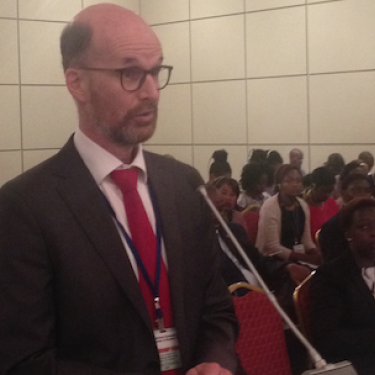RSF appears before the African Commission on Human and Peoples' Rights

In an appearance before the African Commission on Human and Peoples’ Rights yesterday, Reporters Without Borders (RSF) drew attention to the European Union’s irresponsibility as regards Eritrea and urged the Commission to take action. In return for the 200 million euros offered to Eritrea under a development programme for 2016 to 2020, the EU should have demanded information about the fate of the 15 or so journalists who have been held incommunicado since 2001. The journalists, who include Dawit Isaak, have been held without charge or trial and have not been allowed the right to visits or to speak to a lawyer. RSF urged the Commission to give them its special attention, in the spirit of the 1991 Windhoek Declaration.
58th Ordinary Session of the African Commission on Human and Peoples' Rights
Banjul, Gambia
Public Session / Human Rights Situation in Africa
April 2016
Statement delivered by Reporters without Borders (Swedish Section)
“ Respected Commissioners, State representatives, fellow NGO-members.
I come to you somewhat embarrassed of being a citizen of the European Union.
This experience further underlines the very importance of the African Commission on Human and Peoples’ Rights and of the Human Rights work which is done on this continent.
Some months ago the European Union decided to give Eritrea 200 million euro in Development aid 2016-2020.
That is the root of my embarrassment.
For years Eritrea has been last of all countries on Reporters without Borders’ Press Freedom Index.
And according to the Committee to Protect Journalists Eritrea is the hardest censored country in the world.
As the Commission is well aware my fellow Swedish citizen and colleague Dawit Isaak is among the journalists imprisoned since 2001 in Eritrea. He and his colleagues have never been given a trial. They have not even been charged with a crime.
As a European citizen and activist for Freedom of Expression I had expected the European Union to bring his case up with the Eritreans when negotiating those millions in aid.
By pointing to the case of one of its own citizens the EU could then have pushed for all the other journalists in detention too.
I wrote to ask the European Commission what they did.
Their reply was shameful.
They had not even mentioned Dawit Isaak’s name in the negotiations with Eritrea. Let alone the names of all his incarcerated colleagues.
I say this amounts to abandoning them.
The EU did not stand up for Freedom of Expression.
That’s why I am embarrassed.
This underlines why your role, Respected Commissioners, is so crucial. Before you there is the case of Dawit Isaak. If EU does not help him and his colleagues, you can.
Another source for inspiration is the Windhoek Declaration from 1991. That African conference laid the very fundament of what is now celebrated as the International Day of Press Freedom, 3 May.
In the 57th session in November last, the representative of Eritrea, replied to us and to East and Horn of Africa Human Rights Defenders. His statement demonstrates the difficulties in this issue. The Eritrean representative branded Dawit Isaak, Seyoum Tsehaye and their colleagues as so called journalists. That is a strange observation as numerous articles, books, films and photographs by Dawit and Seyoum have been published. Seyoum Tsehaye was even head of national Television in Eritrea.
The representative went on to say that that none of the detained have been imprisoned for using their Freedom of Expression.
Well, they have never been charged with anything. And they were imprisoned when the Government closed all independent media overnight in 2001. That is indeed a full frontal attack on Freedom of Expression.
The burden of evidence rests fully with the Eritrean authorities.
The journalists are denied their right to see a lawyer. They are kept in isolation. The authorities will not say where. Dawit Isaak has been imprisoned for almost 15 years. His family - now living in my country - have not been allowed to see him since.
I would underline that this detention is in violation of numerous African and international conventions.
Eritrea has denied the Special Rapporteur of the UN Human Rights Council entry. They have denied entry to the Council’s Commission of Inquiry.
A more positive note is that Asmara reportedly accepted a visit by another UN Committee not long ago. Because there certainly needs to be an opening to save the lives of those detained.
I wish to finish by quoting from the statement by the Special Rapporteur given to the Human Rights Council in March about why so many unaccompanied minors flee Eritrea. A major factor beside the indefinite national service, she reported, is those children’s fear and I quote of “arbitrary detention for exercising fundamental freedoms such as freedom of expression or religion”.
If not the EU, you do represent a hope there.
Thank you “



